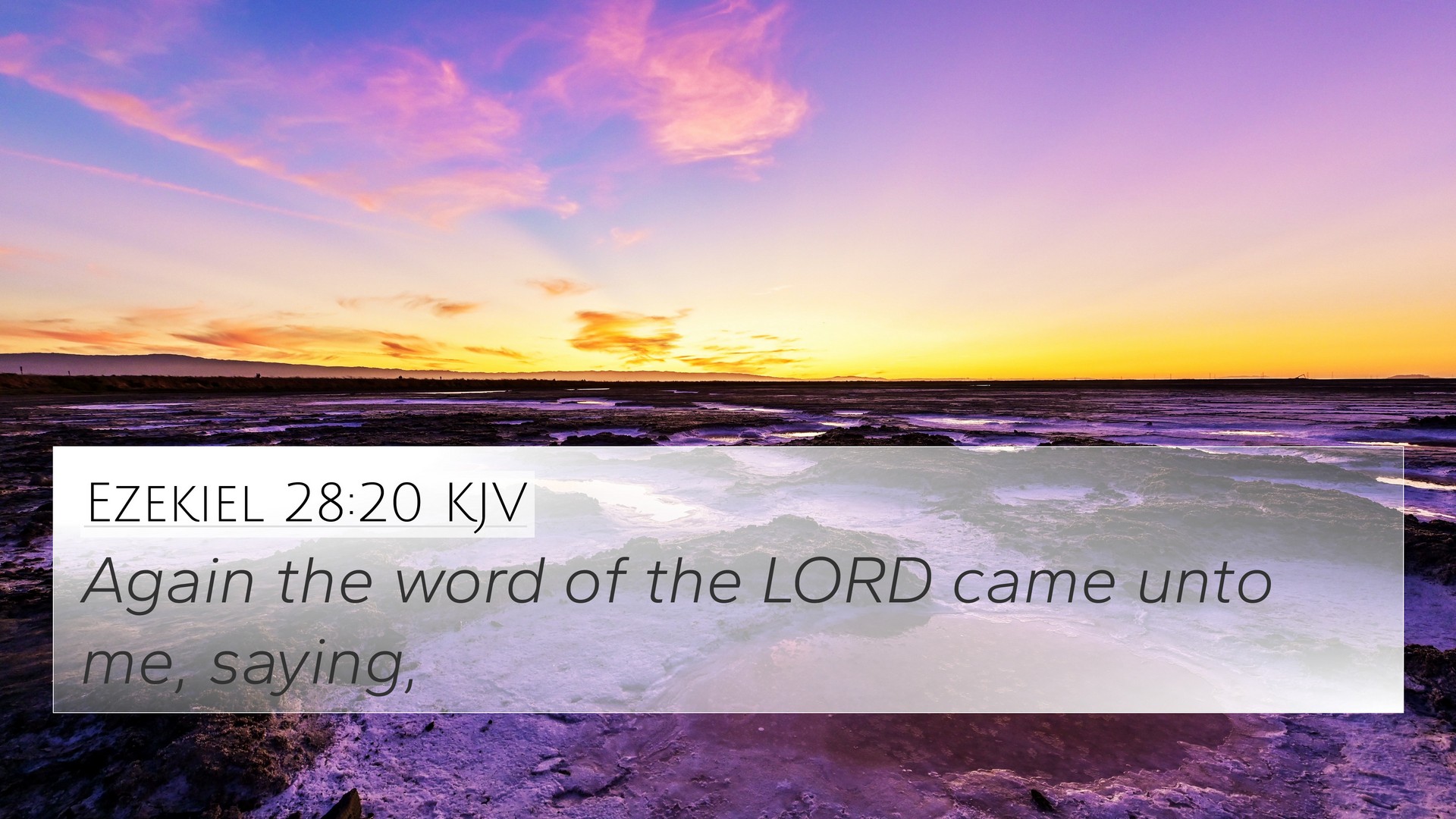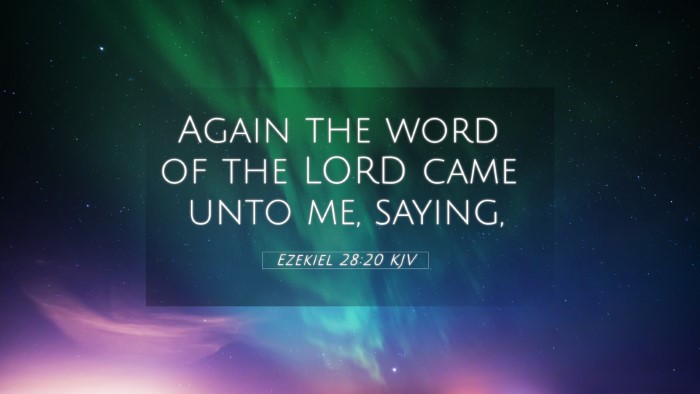Ezekiel 28:20 - Meaning and Interpretation
Ezekiel 28:20 states:
"Again the word of the LORD came unto me, saying,"
This verse signifies a pivotal moment of divine communication, establishing the context for subsequent proclamations made by the prophet Ezekiel. Below is a comprehensive analysis derived from public domain commentaries.
Summary of Divine Communication
This passage highlights the nature of God's ongoing dialogue with His prophets. Ezekiel, as a chosen vessel, receives messages that convey the will and insight of God concerning Israel and the nations.
Commentary Insights
-
Matthew Henry:
Matthew Henry emphasizes the importance of prophetic revelations in guiding the people of Israel. He notes that God's words were a direct response to the spiritual condition of the nation and a precursor to the judgments that would follow.
-
Albert Barnes:
Albert Barnes suggests that the recurrence of God's word indicates a significant shift or declaration. He interprets the prophetic discourse as not just historical but also relevant for contemporary audiences, urging them to heed divine messages.
-
Adam Clarke:
Adam Clarke reflects on the moral implications of such divine communication, asserting that the people are accountable for their understanding of God's message. He stresses that the prophetic voice is meant to awaken a sense of repentance and renewal.
Connections Between Bible Verses
Ezekiel 28:20 serves as a spiritual linchpin, connecting various themes throughout the scripture. Here are some related verses that elucidate significant aspects of divine communication and prophetic messages:
- Jeremiah 23:31: "Behold, I am against the prophets, saith the LORD, that use their tongues, and say, He saith."
This verse reinforces the seriousness of prophetic utterances and God's authority over them.
- Ezekiel 3:17: "Son of man, I have made thee a watchman unto the house of Israel."
This verse connects the role of the prophet as a mouthpiece for God, reiterating the responsibility bestowed upon Ezekiel.
- Isaiah 6:8: "Also I heard the voice of the Lord, saying, Whom shall I send, and who will go for us?"
This resonates with the theme of divine calling and responses to God's call.
- Amos 3:7: "Surely the Lord GOD will do nothing, but he revealeth his secret unto his servants the prophets."
This demonstrates the link between God’s intentions and the prophets who communicate them.
- 1 Peter 1:21: "For the prophecy came not in old time by the will of man: but holy men of God spake as they were moved by the Holy Ghost."
This underscores the divine inspiration behind prophetic messages.
- Luke 1:70: "As he spake by the mouth of his holy prophets, which have been since the world began."
This passage depicts the continuity of prophetic voices throughout history.
- Hebrews 1:1: "God, who at sundry times and in divers manners spake in time past unto the fathers by the prophets."
This outlines the various methods in which God communicated through His prophets.
Thematic Bible Verse Connections
Examining Ezekiel 28:20 alongside other scriptures paints a broader picture of prophetic duty, accountability, and urgency in proclaiming God's messages:
- Responsibility of Prophets: The themes found in Ezekiel resonate in the calls made to other prophets like Moses (Exodus 3:10) and Isaiah (Isaiah 6), emphasizing accountability to God's call.
- Judgment and Restoration: Connections can be made with the messages of judgment in the minor prophets and the assurances of restoration, seen in Jeremiah 29:11.
- God's Sovereignty: The unfolding narrative showcases God's sovereignty over decisions made by nations, covered extensively in the historical books and echoed in New Testament teachings.
Cross-Referencing Biblical Texts
For effective study, employing cross-referencing techniques can yield deeper insights. Below are tools and methods that might assist in finding connections between Bible verses:
- Bible Concordance: Utilize a concordance to locate keywords associated with themes in Ezekiel and related passages.
- Cross-Reference Bible Study: Engage in cross-referencing to explore how Ezekiel's themes appear throughout both the Old and New Testaments.
- Bible Chain References: Following the chain reference method can link thoughts and prophecies through the scriptures, weaving a tapestry of understanding.
Conclusion
In conclusion, Ezekiel 28:20 is not merely a historical text but resonates through the ages, inviting readers to reflect on the implications of divine communication. Understanding this verse in the context of inter-Biblical dialogue and ongoing scriptural conversations enhances our grasp of God's intentions and the prophetic legacy that continues to inspire faith today.


